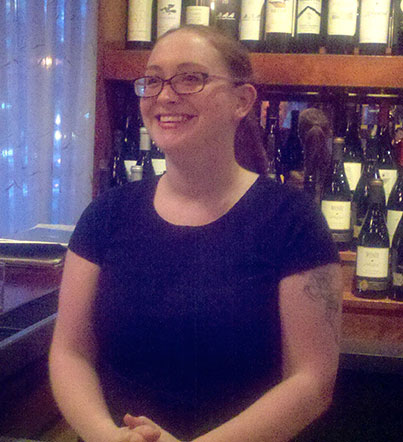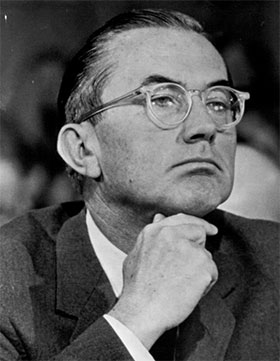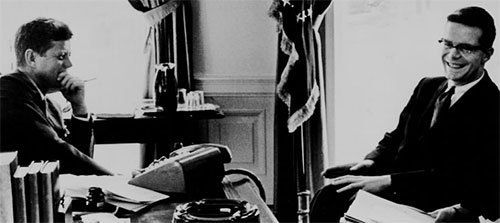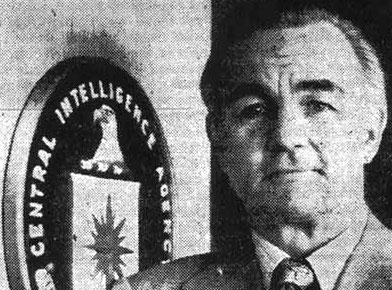A Matter of Trust

(Tinker Belle holds down the Willow bar).
Willow was having one of those golden afternoons where the doors to the patio were propped open and the dust motes glowed in the rays of the lowering sun.
Jasper was running around as always- I don’t know when he doesn’t work- and Tinker Belle was handling the mixology behind the bar, awaiting Brett’s arrival at cocktail hour to handle his second job of the day. He is actually a computer programmer, or a movie star or something most of the day.
Mac had motored over to the bar in the Jag, claiming to feel a little tired, but he was ready to speak, and I let him. Old Jim was listening to his MP3 player at the apex of the Amen Corner.
“So, it is the mid-1970s. You are moving around in the various staff elements of the IC Staff as a special assistant.
“I was. There were other personnel who were coming and going, as there was considerable turbulence in the staff, both personnel-wise and organizational. It was natural, since the Pike and Church commissions had made so many demands on the IC. As the DCI’s agents for compliance, we tried to feel our way and better establish ourselves in the Community. We were still housed in the CIA building at Langley. Later we moved down to the old Selective Service building near the White House, since everyone thought that because we worked on the sixth floor of the Original Headquarters we were a wholly-owned subsidiary of the Agency.”
“The Agency still thought so, too, and that was twenty years later.”
Mac smiled over the rim of his glass. “We were still treated with suspicion by most elements of the IC. The work that we were doing, except in the program and budget areas, continued to be highly suspect by all concerned. Danny Graham took a crack at being the director of the staff, I think temporarily, before he became Director of DIA. He had served with us on the staff from the Schlesinger days, and he moved up to be interim director before Sam Wilson came. But I think it’s safe to say that, after Bill Colby got himself well settled in as DCI — he having been an old hand in intelligence, and he clearly knew where he was going- when Sam Wilson came in as Director of the IC Staff, I think Sam more than anyone else put order into the work of the IC Staff. It wasn’t something that he could do too quickly, and it evolved over time. But he was there long enough to do it, to actually accomplish it.”
“There is an ebb and flow to staff organizations. Look at the Director of National Staff. It is getting huge since it was implemented. But you were done with Program and Budget and were a trouble-shooter for Director Colby?”

(DCI William Colby testifies to Congress).
Mac nodded. “The DCI performed functionally and legally as the Pater Familia of intelligence. In a sense, we were clearly a projection of the DCI because he had legal responsibility reinforced by subsequent congressional actions to oversee and coordinate the whole shooting match- responsibility without the complete authority to tell people what to do. But many departments and agencies in the community outside of CIA continued to treat us with circumspection, if not outright contempt. They never took us fully into their confidence on things that they didn’t think we needed to share. We were effective in coordinating and consolidating the program and budget.”
He took a sip of beer and smiled in pleasure. “In other activities,” he continued, “We didn’t fare as well. In order to gain respect, and I think that’s the best way to word it, the IC Staff, as it grew, tried to do things that they conceived as perhaps not being done well or as completely by the individual elements of the community and that could maybe be done better and more effectively centrally. That’s one reason that we got into post-mortems, for example.”
“What was a ‘post-mortem?’ ” I asked. Something like the USS Pueblo Damage Assessment you worked on at DIA?”
“Yes, but more comprehensive. The thinking was that the IC Staff should look over the involvement of several agencies in a given action from a strategic perspective, assess if it could have been done more effectively and make recommendations on changing things.”
“I imagine that would be quite a threat to the agencies, if they thought they were being second-guessed after the fact.”
“You bet. I think the post-mortem effort fell on its face because the other agencies, if they had performed poorly, didn’t want to share it with the IC Staff or other elements of the Community who would try to grab their resources or mission. We did try, though. I participated in the Mayaguez post-mortem.”
“That was the official last combat mission of the war in Southeast Asia, and we left Marines behind.”
“Yes, and not a pretty tale. But I knew we were not getting the full story from all of the agencies and I knew we were not going to be able to write reports that would be complete and accurate. But as usual here in Washington, nothing is either of those things. I was happy in 1975. At that time, certain legal actions of the Attorney General put a job on the DCI’s that required full-time attention and the continuity of at least one person in order to make sure things went smoothly. All I can say was that it was in the electronic surveillance area ”
“You are being cagey, Admiral. Is that what we are not going to talk about?”
“The very one,” he said, taking a sip of his beer. “I worked that program until I retired for the second time. Those duties took up about half of my time. In the rest of it, I worked things transition issues between the Ford and Carter Administrations.”
“Now you getting into territory I actually remember,” said with a laugh.

(JFK and Ted Sorenson at the White House. Photo AP).
“Whippersnapper,” he said with a laugh. “I helped brief Ted Sorensen prior to his confirmation hearings, and frankly it was no surprise to me he didn’t get confirmed. I thought in briefing him that he had relatively low regard or low appreciation for security. If you look it up when you get home, I think you’ll find he was charged with some security laxity over time that didn’t speak well for himself and for his earlier service to President Kennedy.”

“Admiral Stansfield Turner became second choice, and he was brought in as a nominee. Admiral Turner spent, I think, approximately a month getting ready for his confirmation hearings. He was given an office in the Old Executive Office Building with a small group of people, most of whom he brought in with him from duty stations in the Navy. Some of the people had been with him since he was at the Naval War College at Newport and also had been with him over in Naples. They were neither intelligence officers nor intelligence experts, but the point was that Admiral Turner clearly relied on them ahead of the advice he got from other people.”
I smiled, since it was a familiar story. “I knew one of them- I forget his name- but he was on the Senate Intelligence Committee and he told me once it was eerie working there. He said the Turner people were treated as almost being invisible.”
“I think that is an accurate assessment. Of course, we were downtown and out of the Headquarters by then, and out of sight, out of mind.”
“So you had an Intelligence Community that did not trust the IC Staff and a DCI who trusted no one.”
“That is about the size of it. Our time with Admiral Turner was not a placid one.”
“But you kept working right up through the election of Ronald Reagan as President?”
“I did. I was a special assistant to Bill Casey. That was an interesting man.”
“I bet. And then you retired again in 1984?”
“Yes. We discovered that Billie was ill with something really sinister. Alzheimer’s, the early onset kind. It was time for me to stay home and become a caregiver.”
I gave a little shiver, since Dad had just succumbed to that cursed disease the past January. Watching his steady decline from dashing Naval Aviator and yachtsman to wasted shell was a wrench for five long years. “I know how awful the process is. You helped me a lot in knowing how to deal with it.”
“We managed to keep Billie at home for almost ten years. And that is what got me involved with volunteering with the support groups. But that is another story.”
I nodded in agreement. I reached for my wallet after underlining the phrase “fucking dementia” on the cocktail napkin in front of me. In many regards, Mac’s third career might have been the hardest of them.
Copyright 2017 Vic Socotra
www.vicsocotra.com
